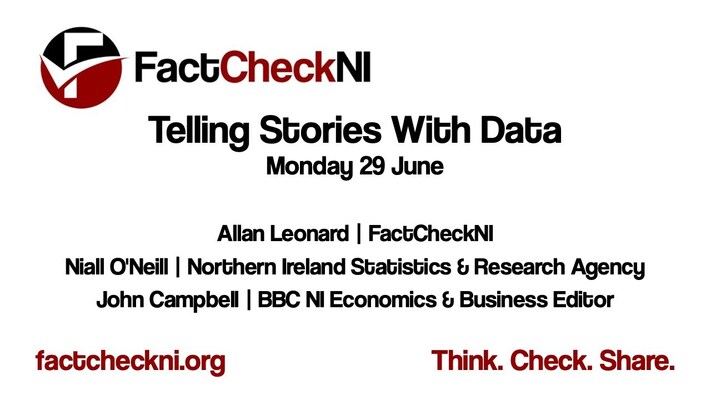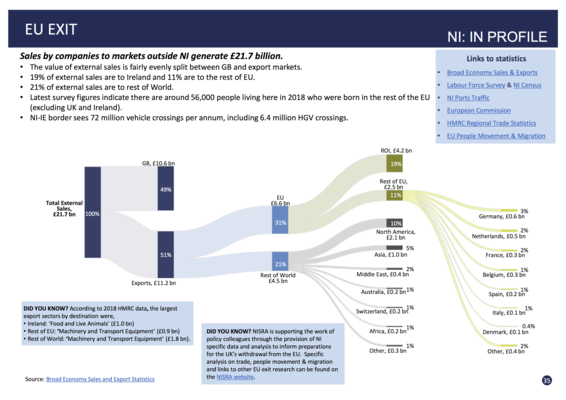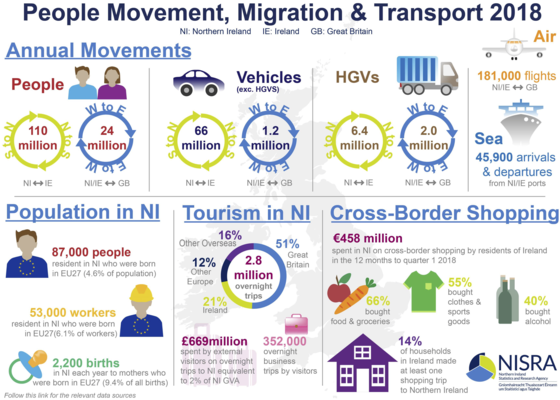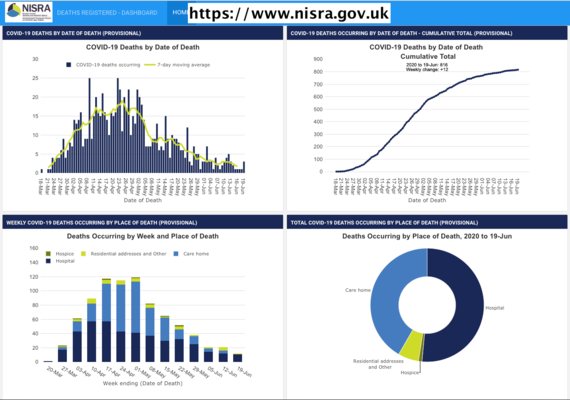Blog
Telling stories with data: FactCheckNI session at Global Fact 7Author: Allan Leonard, Co-founder and Editor-in-chief at FactCheckNI

29 June 20202
As part of the annual summit of the International Fact-Checking Network, FactCheckNI hosted “Telling Stories with Data” at Global Fact 7, an online session that explored the use of data in news and information presented to the public. I moderated the conversation between John Campbell (Business and Economics Editor at BBC Northern Ireland) and Niall O’Neill (statistician at the Northern Ireland Statistics and Research Agency (NISRA). The session aimed to impart an appreciation of the importance of the integrity of trustworthy official data sources and the benefits that this has for fact-checking organisations, through good working relationships with statistics agencies.
I welcomed the audience and guests by describing FactCheckNI as Northern Ireland’s first and only dedicated fact-checking service, which works to foster a culture of critical thinking within a deeply divided society, through our fact checks, explainer articles, how-to guides, and training in schools and local community environments. I added that FactCheckNI is also engaged with media literacy campaigns and research projects, such as Co-Inform.
To start, John Campbell observed that people listen to economic statistics from both an individual and societal perspective — am I winning or losing personally and are we winning or losing as a society? He said that unemployment and wage statistics are good examples. Campbell explained how he is sparing with what data he presents, writing mostly for a TV audience and wanting to make any graphics easy to grasp. He strives to make abstract statistics relevant to real-life people.
He also noted the caveats of any set of data. For example, with unemployment statistics from the International Labour Organisation, skeptics may remark that they include individuals who work as few as one hour weekly. “Yeah, but how many people are working one hour a week?” So he will seek an additional statistic, such as hours worked, to get a fuller understanding. It’s about appreciating the value and qualifications of any statistic.
Niall O’Neill explained how his organisation, NISRA, wanted to produce a central, state-of-the-nation set of statistics that could help explain Northern Ireland societal trends over time as well as highlight particular points of interest. The motivation was to present statistics of particular interest to a wider public, in more accessible ways.
Presented as slides, NI: IN PROFILE covers a broad range of topics, each with a short set of bullet points, a few simple graphics, and hyperlinks to associated data sets. I remarked that it was always helpful to have a suitable, straightforward graphic in FactCheckNI fact checks and explainer articles.


In response to the global COVID-19 pandemic, NISRA began publishing a weekly bulletin on death registrations and his team developed an online dashboard to present the data in a more readily accessible format. This was combined with frequent online briefing between NISRA and journalists, to answer questions and help explain what the data does and does not say. O’Neill felt that these meetings have assisted reporters to use appropriate language when describing the import of these statistics. Through this process, O’Neill said that he’s learned a few quirks of the data, useful feedback for the producing organisation.

O’Neill said that working with journalists gave him an increased appreciation for the relevant skill sets involved in each other’s line of work — numeracy of his colleagues with the communications skills of the media. “By working together, I think we can really inform the general public” he concluded.
I know from speaking with fact checkers at previous Global Fact summits that all this could come across as aspirational in other regions due to accusations of the political corruption of a country’s statistical agency or civil service. I asked the guests for encouragement.
Campbell answered that there are European-based statistics that cover all of the EU, as well as international organisations that produce their own statistics, such as the International Monetary Fund and the World Bank. He gave a specific example of the Purchasing Managers’ Index, a statistic that tends to be produced independently of government, employing the same formula that is used right across the world. Meanwhile, the commercial statistics service, Statista, collates such unofficial as well as official statistics.
O’Neill said that it helps to have a fact-checking organisation drill down and help tell a story. He complimented some fact-checking work by FactCheckNI on the topic of suicide and how those statistics are calculated. Here, I gave credit to NISRA and its longstanding appreciation of fact checking, predating the establishment of FactCheckNI.
I summarised the session by saying:
- having an interest in numbers is useful for enhancing a fact check, but that there’s no need for a fact checker to be an expert;
- what matters more is knowing how to get relevant data;
- it’s important to spend time getting to know a set of statistics, and worth asking the relevant agency directly for general assistance … and reading those guidance notes; we should demand more from agencies to present data in more user friendly ways and with links out to more detail;
- consistent with the accountability role that fact checkers serve, it is our responsibility to ensure the integrity of statistical agencies and all of its products and services;
- we all have a right to demand to be able to understand the statistics that are being produced in our name.
All of that should foster positive working relationships and facilitate a better reporting of facts that will serve the public good.
Co-Inform’s mission is to foster critical thinking and digital literacy.
Academic surveys have shown that online misinformation is becoming more difficult to identify. Online misinformation has the potential to deceive even readers with strong literacy skills. Our goal is to provide citizens, journalists, and policymakers with tools to spot ‘fake news’ online, understand how they spread, and obtain access to verified information.
Original and unabridged version “Telling stories with data: FactCheckNI session at Global Fact 7” published at FactCheckNI.
Subscribe to our newsletter
Get our latest project updates, news and events announcements first!

Co-inform project is co-funded by Horizon 2020 – the Framework Programme for Research and Innovation (2014-2020)
H2020-SC6-CO-CREATION-2016-2017 (CO-CREATION FOR GROWTH AND INCLUSION)
Type of action: RIA (Research and Innovation action)
Proposal number: 770302




